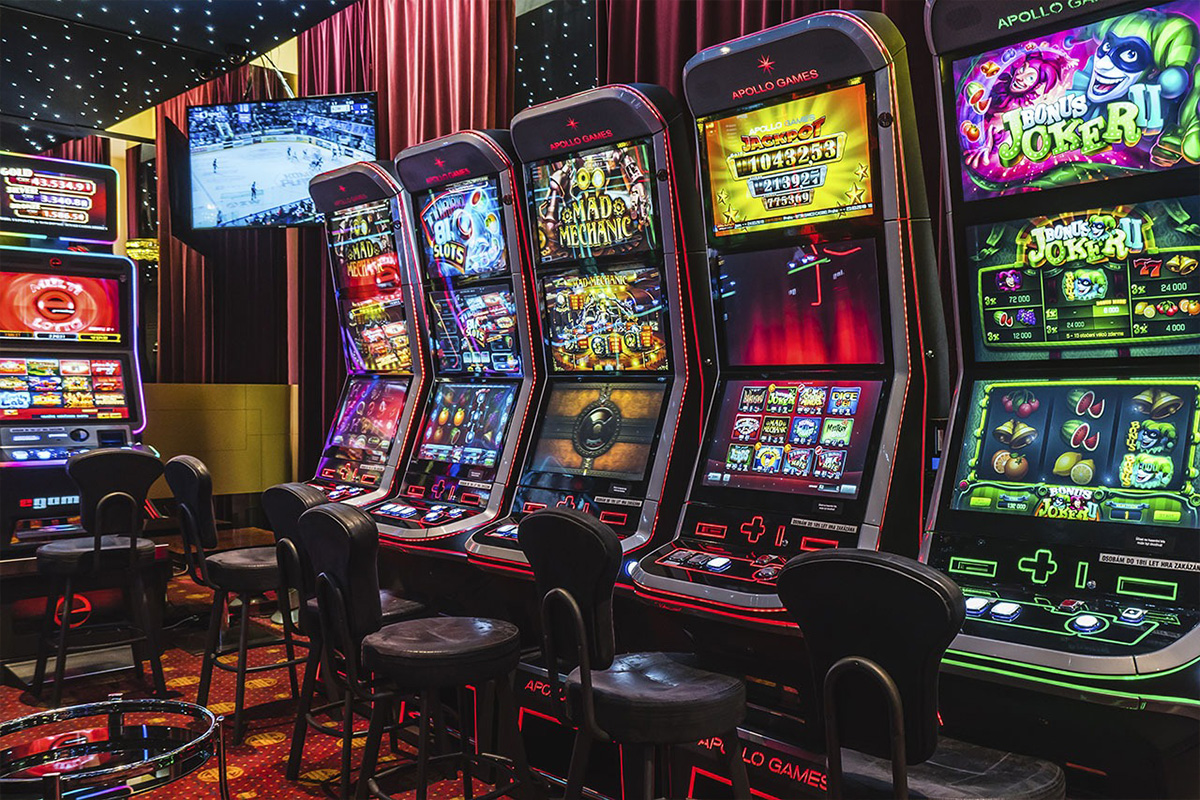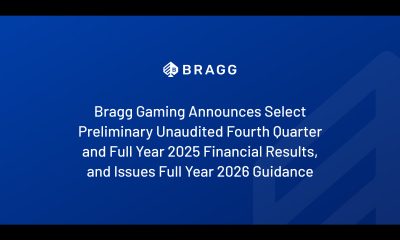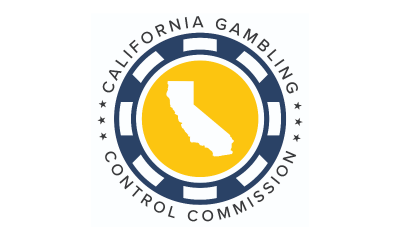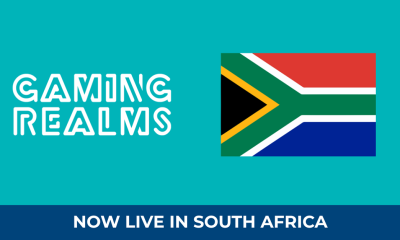Industry News
ECA Says European Casino Revenues Down 50%

The European Casino Association (ECA) has said that the European land-based casino sector has been hard hit by the pandemic.
ECA this week released statistics that show a devastating year for the bricks-and-mortar gambling industry through a poll of members.
The European casino industry was closed for an average of 136 days in 2020 and most operators have been closed for the first quarter of 2021. Seventy percent of casinos are currently shut down, with some exceptions this year, including Luxembourg, Spain and Monaco, but with restrictions.
The industry lost an average of over 37% of normal operating days last year and revenues have fallen by over 50%. The majority of ECA members do not have a clear schedule for the official reopening in 2021. Before the pandemic members employed 70,000 staff in their 900 casinos, an employment number that is likely to fall to 50,000 when reopening is allowed.
ECA chairman Per Jaldung said: “This is the deepest trough the European land-based casino industry has ever experienced. The financial impact of the pandemic on the land-based casino sector has been extreme and these numbers show the economic realities of Covid-19 on the European land-based casino sector.
“Some casinos have closed permanently and many casino employees have lost their jobs. We are under no illusion that the industry can return to ‘business as usual’ any time soon. We are, as a matter of fact, very far from business as usual.”
Restricted opening hours, maximum occupancy and amenity limitations, social distancing protocols, restricted gaming offers, protective measures including plexiglass, masks and on-site testing are just some of the hurdles that the land-based casino business is currently facing.
Country to country variations in the restrictions and mandates have also been compounded by regional variations within national borders. These restrictions are the next major challenge for a sector that the pandemic has hit the hardest.
ECA secretary-general Hermann Pamminger said: “Guests want to visit casinos again. The relaxation and tightening of numerous lockdowns in 2020 demonstrated the ability of the land-based sector to safely and responsibly return to business.
“Guest registration has enabled quick and practical social distancing measures and casinos have implemented comprehensive hygiene initiatives, far exceeding local requirements, ensuring that our guests feel comfortable and safe.
“Our industry is part of the service and tourism sector in which we employ a large number of highly trained and motivated people. The closures affected 130,000 direct and indirect employees, not only across our gambling facilities but also in our restaurant and entertainment areas.
“Our employees cannot wait for the day business is back to normal and they can once again welcome guests to their casino and entertainment venues, but our industry continues to need support to achieve this during an extraordinarily challenging period.”
Powered by WPeMatico
Ashley McCulloch Vice President North America at Evoplay
Evoplay Names Ashley McCulloch Vice President North America

Evoplay, the acclaimed game development studio, has named Ashley McCulloch as Vice President North America, strengthening its strategic emphasis on growth throughout the US and Canada.
McCulloch has over 15 years of experience that includes land-based, VLT, and online gaming. She has occupied high-level commercial positions at IGT and Light & Wonder and most recently worked as Director of Account Management North America at Inspired Gaming Group, where she led strategic account development and assisted with new market entry projects.
In addition to her commercial success, McCulloch serves as a board member for Women in Sports and Events, is part of Global Gaming Women, and was recognized in the 2024 Emerging Leaders in Gaming 40 Under 40, highlighting her influence in the industry.
At Evoplay, McCulloch will lead partnerships, regulatory licensing, product launches, and broader business development efforts as the provider speeds up its growth in the North American market.
Evoplay has secured a significant presence in the area, launching in Ontario via collaborations with prominent operators in the province, such as BetMGM and Caesars Entertainment.
In November 2025, Evoplay made a notable initial move into the United States by joining the lottery sector in Washington DC, establishing a connection to the US online gaming landscape.
With McCulloch’s hiring, the company aims to leverage this momentum and continue its expansion throughout regulated US states.
Ivan Kravchuk, CEO at Evoplay, said: “North America represents one of the most exciting growth opportunities for Evoplay, and Ashley McCulloch’s appointment is a major step forward in realising our ambitions in the region.
“Her extensive experience across land-based and online gaming, combined with her track record in commercial strategy, makes her the ideal person to lead our efforts as we scale.”
Ashley McCulloch, Vice President North America at Evoplay, added: “I’m very excited to be joining the Evoplay team at such a pivotal moment in its growth journey.
“The studio has built a strong reputation for high-quality content, and I look forward to developing partnerships and driving sustainable growth across North America.”
The post Evoplay Names Ashley McCulloch Vice President North America appeared first on Eastern European Gaming | Global iGaming & Tech Intelligence Hub.
Africa
VeliGames Secures SiGMA Africa’s Industry Rising Star Award

VeliGames, a game aggregation platform from VeliTech, has received the Industry Rising Star award at the SiGMA Africa 2026 Awards, highlighting the platform’s swift innovation and significant influence on African iGaming.
The Industry Rising Star award highlights a developing company that displays remarkable potential, creativity, and influence, rapidly positioning itself as a forthcoming leader in the iGaming sector. It emphasizes VeliGames’ dedication to providing not just a content pipeline, but also genuine innovation and a comprehensive growth engine for operators in developing markets.
“Winning the SiGMA Africa Award for Industry Rising Star 2026 is a proud moment for our team. From day one, we built VeliGames with African operators in mind, combining local-fit content, practical tooling, and pricing that makes sense on the ground. We back it all up with hands-on operational know-how from working in the region. That’s what being a true content partner looks like.” Irakli Kakhidze, CEO at VeliGames.
Tailored for Africa’s infrastructure challenges, device characteristics, and user habits, VeliGames provides a performance-oriented casino content layer aimed at thriving in areas where conventional, high-bandwidth aggregation methods struggle. Rather than solely competing based on catalogue size, VeliGames prioritizes the key factors that genuinely contribute to casino success in Africa: speed, accessibility, conversion, and session stability.
The platform delivers content in a highly efficient, mobile-centric setting designed to function dependably amid variable connectivity, restricted device storage, and brief gaming sessions, assisting operators in ensuring seamless gameplay and enhanced player experiences on a larger scale.
Alongside curated third-party titles, the platform includes exclusive in-house content:
- VeliPlay: bold, crash-and-fast titles built for immersion, retention, and high replay value
- Heaven of 7: high-impact slot content designed for strong engagement, session after session
Visit VeliTech at Stand 096 from March 3-5 to learn why VeliGames was honored as the Industry Rising Star. Discover live game demonstrations, witness performance features in action, and learn how operators can create unique iGaming brands with a platform designed for regional requirements.
The post VeliGames Secures SiGMA Africa’s Industry Rising Star Award appeared first on Eastern European Gaming | Global iGaming & Tech Intelligence Hub.
Groove
Groove Technologies Targets High-Growth Sweepstakes Market Following Strategic Appointment

Groove Technologies, a prominent iGaming aggregator and platform provider, has today revealed a strategic enhancement of its sweepstakes operations through the internal elevation of Michael Kitseliuk to the newly established position of Sweepstakes Account Manager. This action highlights Groove’s dedication to continue expanding in one of the industry’s most vibrant and swiftly growing sectors.
The appointment comes after a phase of rigorous technical advancement and evaluation, placing Groove’s enterprise-grade platform to provide unmatched sweepstakes solutions. The platform, famous for its cutting-edge player engagement features, live analytics, and a collection of more than 15,000 games from over 150 leading providers, is now enhanced to achieve new heights of scalability and profitability for operators using the sweepstakes model.
Michael Kitseliuk, with three years of essential experience from Groove’s technical operations team, will lead this initiative in his new role. His profound technical knowledge guarantees a smooth and straightforward integration experience for partners.
“I’m thrilled to be leading the charge on Groove Sweepstakes,” said Kitseliuk. “This vertical represents the forefront of market accessibility. The lighter regulatory footprint allows operators to launch faster and tap into vast audiences with incredible speed. We’re not just following a trend; we’re empowering our partners to unlock a significant new revenue stream and open doors to previously complex markets.”
The need for high-quality sweepstakes material has reached unprecedented levels. Groove’s strong entertainment ecosystem, which introduces more than 150 new games each month, is distinctly suited to drive this expansion. The firm has assembled a robust stream of content, prepared for delivery via its sophisticated platform.
Rachel Tourgeman, Head of Partnerships at Groove, highlighted the extensive preparation and market offering: “This isn’t a one-size-fits-all solution. We’ve undertaken rigorous, bespoke technical testing for each provider to guarantee a flawless experience for both the operator and the player. This diligence means we can now offer our operator cluster access to a vast network of nearly 50 premier game providers specialising in sweepstakes coins, all integrated and ready for launch.”
This strategic focus amplifies Groove’s core strengths: speed, variety, and technological excellence. By dedicating new leadership to the sweepstakes vertical, Groove ensures its partners can capitalise on this growth with a competitive edge.
Yahale Meltzer, Co-Founder and COO at Groove, concluded: “Our promotion of Michael into this dedicated role signals a new era for our sweepstakes platform. We are harnessing its full potential to offer operators super-fast integrations, a proven and diverse game library, and a technically superior platform. This is a definitive step in providing a complete, market-leading solution for every segment of the iGaming industry.”
The post Groove Technologies Targets High-Growth Sweepstakes Market Following Strategic Appointment appeared first on Eastern European Gaming | Global iGaming & Tech Intelligence Hub.
-

 Adjusted EBITDA7 days ago
Adjusted EBITDA7 days agoBragg Gaming Announces Select Preliminary Unaudited Fourth Quarter and Full Year 2025 Financial Results, and Issues Full Year 2026 Guidance
-

 Bagley-Keene Act7 days ago
Bagley-Keene Act7 days agoCalifornia Gambling Control Commission Issues Critical Guidance on Stakeholder Communications and Ex Parte Rules
-

 iGaming6 days ago
iGaming6 days agoPRAGMATIC PLAY UNEARTHS PROGRESSIVE MULTIPLIERS IN ROLLING IN TREASURES
-

 Comatel5 days ago
Comatel5 days agoCOMATEL CELEBRARÁ UNA FIESTA PARA CIENTOS DE OPERADORES TRAS FINALIZAR EL PRIMER DÍA DE LA FERIA ESPAÑOLA, INTERAZAR
-

 Africa7 days ago
Africa7 days agoGroove Targets Africa’s iGaming Boom at SiGMA Cape Town 2026
-

 Booming Games6 days ago
Booming Games6 days agoBooming Games Introduces Instastrike, the Latest Diamond Hits Trio
-

 ELA Games6 days ago
ELA Games6 days agoELA Games Powers the Reels with Retro-Electric Slot “Rapid Wild”
-

 Africa6 days ago
Africa6 days agoGaming Realms Makes South African Debut in Partnership with Hollywoodbets



















